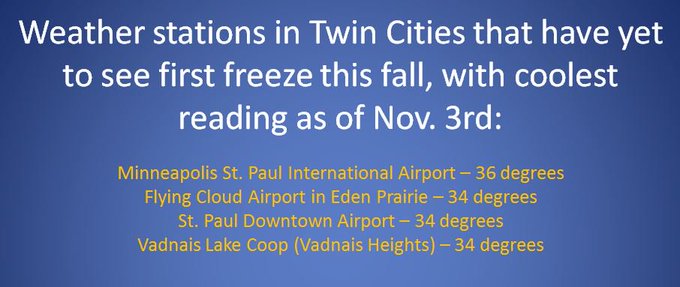Published: November 6,2016
Another side effect of the record warmth that has dominated much of the U.S. since October is the lacking of freezing temperatures. Most cities in the Midwest have yet to see the thermometer drop to the 32-degree mark and now records are in jeopardy.
A persistent upper-level ridge of high pressure has brought warmer-than-average temperatures to the Plains, Midwest, South, and at times the Northeast. There does not appear to be a pattern change until mid-November at the earliest.
Numerous daily record highs were set at the end of October and beginning of November and a few monthly record highs were even broken for November. More record highs were set over the weekend, including in Minneapolis which hit 73 degrees Saturday, and in Milwaukee which hit 70 degrees Sunday. This trend now has its sights set on breaking records for latest first freeze.
(MORE: Why Has Much of the Weather in the U.S. Been Quiet Lately)
Temperatures below freezing have been hard to come by lately in the contiguous U.S. You need to head towards northern New England and some of the higher elevations of the inter-mountain West to find freezing conditions. Consequently, locations that would have normally seen their first freeze of the season are still waiting.
Current Temperatures
A few
locations in Twin Cities metro have yet to see their first freeze
(temperature at or below 32 degrees). Average date is Oct 10th #mnwx
It is also interesting to note that Minneapolis has only seen their first freeze in November seven times since 1873; the last this occurred was in 1958.
La Crosse, Wisconsin, will also likely see its latest first freeze if the temperature stays above 32 degrees through Nov. 7. That record could be extended right through late this week before temperatures flirt with the freezing mark this coming weekend.
 Dates of latest first freeze on record and average freeze based on data from 1981-2010.
Dates of latest first freeze on record and average freeze based on data from 1981-2010.Another Michigan city that could set a new record for latest freeze is Detroit. The current record is Nov. 15, which was set in 1946 and the current forecast does not anticipate freezing temperatures before then. However, lows in the mid 30s are expected late this week.
Madison, Wisconsin is another location that may break their latest freeze record. The current latest freeze is Nov. 12 and lows in the 40s are expected into much of this week. However, late-week temperatures may briefly drop close to the 32-degree mark.
Another city to watch is Des Moines, Iowa, where lows are expected to approach 32 degrees late this week. The current record is Nov. 13 so it will be interesting to see how close to the freezing mark temperatures drop.
If the current warm forecast holds then more records may fall later this month. This includes Kansas City, Missouri, and Chicago, which both have records for latest freeze on Nov. 24, as well as St. Louis, Indianapolis and Cleveland which have their latest freezes currently on Nov. 27.
(MORE: November Outlook)
 November temperature outlook from The Weather Company, an IBM business.
November temperature outlook from The Weather Company, an IBM business.Farther east, many cities in the interior Northeast have already seen their first freeze, but along the East Coast they are still waiting for the winter chill. This is not unusual though, as Boston, New York, Philadelphia and Washington, D.C. all normally see their first freeze in November, with their record latest freezes occurring in December.
(MORE: Siberia Is Being Clobbered With Snow and That Could Mean a Harsher U.S. Winter Ahead)
There are indications than a southward dip in the jet stream may develop over the East in mid-November, which may bring some colder temperatures to the region. It will be interesting to see if some East Coast cities see their first freeze before parts of the Midwest.


No comments:
Post a Comment